
 |
||||
|---|---|---|---|---|
| Volume 50 Number 12, April 4, 2020 | ARCHIVE | HOME | JBCENTRE | SUBSCRIBE |
Workers' Weekly Internet Edition: Article Index : ShareThis
Virus Testing Turnaround Illustrates the Government's Failure to Lead
Workers' Forum:
Health Workers Fight For Testing and Personal Protective Equipment
ASOS Warehouse Workers in Yorkshire Strike over Company Disregard for Workers during Pandemic
Trade Union Receives Evidence of Over-Crowding at Construction Work Sites
Callous Decisions Made at a Time of National CrisisInternational Co-operation in Operation:
The Inspiring Example of Cuba's "Medical Internationalism"UN secretary general:
Recovery from the Coronavirus Crisis Must Lead to a Better World
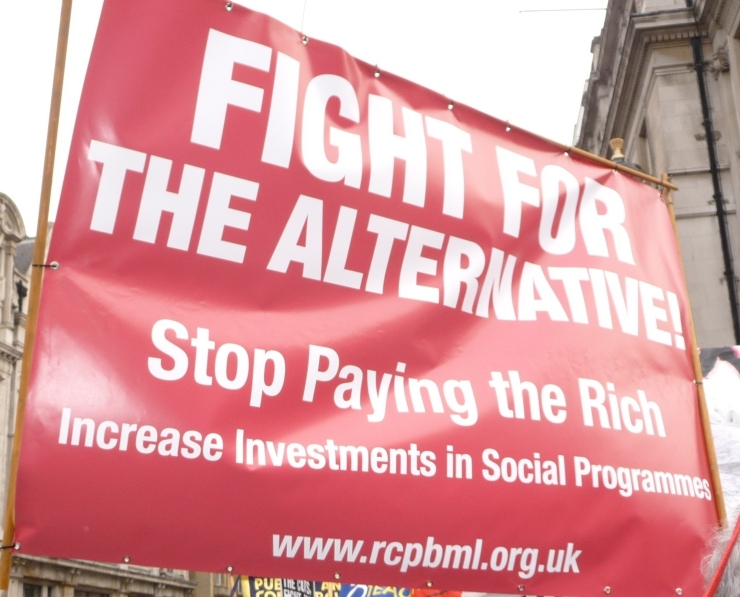
Testing is a critically important measure that should be taken immediately, but the government is failing to do so. Journalists are so frustrated by the answers they are getting that some are considering boycotting government briefings.
Journalists had to repeat the question, time and again, "Why has Britain lagged the rest of the world in testing?" There has been no direct answer because there could not have been, and we are left with posturing and manoeuvring. Prime Minister Boris Johnson responded to criticism of Britain's strategy by hailing screening as a solution to "unlock the puzzle" of coronavirus. The strategy announced on March 18 was for 25,000 tests to be carried out per day, but it has since transpired that this will not happen until mid April, while just 13,000 per day are currently being performed. By comparison, Germany is testing over 70,000 people daily.
Health experts are frustrated by the low testing rate in Britain. Prof Paul Cosford, Emeritus Medical Director of Public Health England (PHE), said that "everybody involved" is unhappy testing has not "got to the position yet that we need to get to". He said testing would hit 15,000 per day "imminently". Only 2,000 NHS frontline staff out of half a million in England have been tested for coronavirus since the outbreak began. Prof Cosford said the figure was "nowhere near where we need to get to but it's a good start".
Labour's Shami Chakrabarti said that the slow pace of testing showed "a lack of clarity of what the plan is and how it is going to be executed".
Sir Paul Nurse, chief executive of the Francis Crick research institute, said a Dunkirk-style effort was needed to co-ordinate smaller laboratories and increase test numbers.
Boris Johnson said that increased screening would be how Britain defeats the coronavirus. He unashamedly exclaimed: "I want to say a special word about testing, because it is so important, and as I have said for weeks and weeks, this is the way through. This is how we will unlock the coronavirus puzzle. This is how we will defeat it in the end."

The rainbow was originally for children to see when out
for a walk that they were not alone, and that other children were at home too
without the physical presence of their friends. It has now become more
widespread symbolising the unity of everyone against the coronavirus. Children
have also been encouraged to send pictures of rainbows to decorate the new
hospitals, should they open, to make them more personal and friendly for the
patients.
Such is the deception of someone in the ultimate position of power, exuding the confidence of sovereignty but unfit to rule in the people's name. It is this complacency at the highest level, with slowness to act, that has caused the disconcerted stances of everyone else.
The stance of the entire cabinet has been to deny the people the benefit of such measures as testing, and hence security, giving such cynical excuses as lack of materials such as swabs! Who does he think he is? Who does the Prime Minister expect to accept such insulting garbage? The government needs to get on, produce and distribute asap!
However, these tests are not yet ready for use and it is not clear when they will be. Dr Yvonne Doyle, PHE Medical Director, said during a Downing Street coronavirus briefing that the "intention" was for testing for front-line staff to increase from "thousands to hundreds of thousands within the coming weeks".
It is their outlook that has held them back. Health Secretary Matt Hancock has now promised talks with industry figures, issuing what his department said was a "rallying call" to improve diagnostic capability. All of this is in response to the developing outlook of the people and to reassure them of why the ruling elite are "needed" to remain at the helm of an otherwise sinking ship.
The continuing shortfalls in swabs, reagents and testing kits have been seriously restricting the number of tests that NHS Trusts have been able to carry out. In just one example, it is reported that, while one Trust in the West Midlands had the capacity to test up to 300 people per day, it was actually testing only 20.
Meanwhile, Addenbrooke's hospital in Cambridge has used a new, much quicker Covid-19 test for staff and patients. Samba Two gives a result in just 90 minutes as opposed to 24 hours. It was adapted from an HIV test by a small Cambridge technology company. Tests could soon be rolled out widely if there were a will to do so.
Once again, it highlights the necessity of empowering the working class and people. It is only when their outlook trumps that of the ruling elite that things can get done. The working class from production, distribution and front-line use are shouting out loud, "Give us the tools and we will do the job!" The existing decision-makers, the status quo, are not reliable. The more control shifts towards the people, the better the outcome.

Weeks after the start of the COVID-19 outbreak and the government claiming that testing of health staff for the coronavirus and that providing Personal Protective Equipment (PPE) was a "top priority", only on Monday, April 1, did the government announce that they were removing the cap and that Trusts had been given the green light to test "as many of their staff as possible". At the same time, the government announced a "PPE audit" amid widespread shortages of basic and vital safety equipment for health workers. However, what is not being said is that in reality this means that health staff are still not being tested in any large numbers and that they are all at great risk and peril fighting a disease without the proper protective equipment.
One health worker had this to say to Workers' Forum: "What is not being discussed with us is how testing will take place, which needs to be done immediately to ensure that staff can work with confidence in fighting this disease without catching it or spreading it. There are concerns about how the testing of all essential staff for the coronavirus will take place. It needs to apply to all medical and non-medical staff in our hospitals and community, as well as care homes, and carers in private homes as quickly as possible."
They also said: "There is some PPE but there is not enough of the right PPE equipment for staff at our hospitals and for working in the community, particularly concerning eye protection. There are literally no visor masks left in our community services and what is being provided is completely inadequate."
According to the Health Service Journal (HSJ), the guidance of Public Health England (PHE) is seriously being questioned by clinicians because their guidelines are suspected of downgrading protection due to the shortage of the right PPE. For example, the HSJ points out in an article[1] that it has seen guidance sent to staff at University Hospitals of Leicester earlier this week which tells staff: "Whenever you enter a clinical area you should wear a face mask." It also indicates that in all areas, regardless of the patients being treated, all staff should wear eye protection, a plastic apron and one layer of gloves. The article points out that the current PHE Guidance is out of date and that this guidance is currently being reviewed. Also, on April 1, an HSJ report describes doctors in the Southend Group at Southend Hospital laying out concerns in letter to trust chief Clare Panniker amid criticism over PPE shortages nationwide.[2]
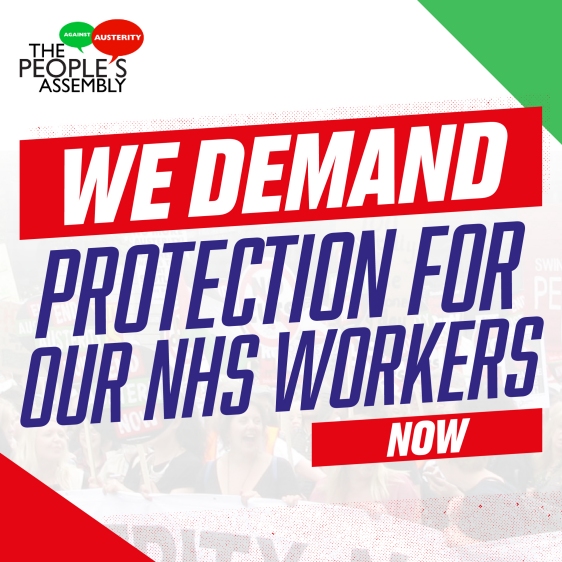
Another health worker, a trade union representative, pointed out: "Surgical masks are not an acceptable standard for this virus at our hospitals. FFP3 masks should be the minimum, but this does not cover eye protection and the eyes are one of the most vulnerable to infection. There is also the question that such protective equipment should be provided to essential portering and domestic, catering staff and others who enter clinical areas, which is not happening at the moment."
The actions of the government and the state of promising eye-watering sums to private companies and individuals, whilst at the same time declaring the problem solved, amounts to reckless action which is costing lives, including the lives of medical staff who are fighting the outbreak. Having claimed two weeks ago that they were ramping testing up to 25,000 tests a day, the government is now admitting that due to "lack of reagents" and laboratory space, they have only been doing at most 10,000 a day but were testing staff as a "priority". How is it possible, then, that as late as this Thursday, tests of health workers still only amounted to 2,800 according to BBC News, with the Secretary of State for Health Matt Hancock claiming this figure was 5,000 tests in his briefing on Thursday evening. Even if the higher figure is to be believed, there are 1.3 million staff in the NHS, and tens of thousands of care workers. Hancock also claimed that they would reach 100,000 tests a day by the end of April. The conclusion can only be that there is no addressing of the reality of the problems in these claims.
What this unacceptable situation is revealing is the inability of the government and the state to organise to solve such vital questions in fighting such an outbreak. Even given the situation that the economy is designed to pay the rich, including via the constant privatisation and profiteering of the supply chain of the NHS that has seriously hampered the supply of vital equipment to save lives, there is still no excuse. The government makes no attempt to mobilise the people to solve these problems and open up a front of production and commandeer the fantastic productive capacity of the country, with all its educated and talented working class and people. Instead, working people are being blocked from this vital production, let alone being mobilised and encouraged to produce, and do everything that is needed to defeat the virus. Yet it is the very fight of the doctors and all medical staff over testing and PPE that is showing by example what governments should be doing, and is inspiring the working class to take the initiative themselves in fighting the virus and its spread.
Notes:
[1] Annabelle Collins and Dave West, "Trusts advise widespread use of
PPE as staff 'refuse to see patients'", HSJ, March 28, 2020
https://www.hsj.co.uk/coronavirus/trusts-advise-widespread-use-of-ppe-as-staff-refuse-to-see-patients/7027258.article
[2] Nick Kituno, "Medics threaten to limit services to 'bare minimum'
without correct PPE", HSJ, April 1, 2020
https://www.hsj.co.uk/workforce/medics-threaten-to-limit-services-to-bare-minimum-without-correct-ppe/7027289.article

Five hundred workers for online fashion and retailer ASOS walked out of the company's warehouse in Grimethorpe, South Yorkshire, on Saturday, March 28, over working conditions during the coronavirus pandemic. Workers have complained that it is "impossible" to maintain the recommended two-metre minimum separation between people at the warehouse, where they are sat at half that distance apart in multiple directions, putting them at serious risk of infection. Some at the site have even claimed that they were told not to wear masks at work, "as it was not part of their uniform"!
"The situation at ASOS is disgusting - thousands of people under one roof, not enforcing social distancing. It looks exactly like a hotbed of infection," said GMB Regional Organiser Deanne Ferguson. "ASOS needs to put people before profits and make sure workers are the right distance apart and paid properly if they need to take time off. Anything else is putting unnecessary lives at risk," she added.
"We totally refute these allegations," responded ASOS management. "We are striking the right balance between keeping our warehouse operational for the good of employees and the wider economy, and maintaining the health and safety of staff. An environmental health officer visited and was happy."
Barnsley East MP Stephanie Peacock said: "I have spoken to a number of concerned workers employed at the ASOS warehouse in Grimethorpe who feel that their health is being put before profit in this national crisis. It is imperative that we all do our bit to stop the spread of coronavirus, saving lives. ASOS employs more than 4,000 workers in the UK. They shouldn't have to put them and their family's well-being on the line for a pay cheque." She has has written to the CEO of ASOS expressing these concerns.
The "refutation" notwithstanding, it seems clear that the management, who are the decision-makers on behalf of the retail monopoly, will not organise to keep a safe space between workers in line with official instructions on social distancing. This management, posing the problem as one of "balance", is showing no concern over the health and well-being of employees and by extension the general public. The company is blatantly flouting government guidelines and are operating around loopholes where they can. The retailer refuses to close operations over non-essential work during the crisis and refuses to pay workers who are not available or do not turn up.
Everything is done in order to ensure business remains profitable. Management buy the capacity to work and think that they can do with it whatever they want, when and how they want to utilise that capacity. The needs of capital come first. Workers have been challenging the situation by exercising their right to withdraw that labour.
Workers want to become involved to change the situation regarding the pandemic. They do not like being treated as pawns. Hence the action to withdraw their labour. The reality is the crisis has heightened consciousness above what it was before the outbreak of the disease. More than ever the issue of control over the productive forces in society points towards fighting for something New.
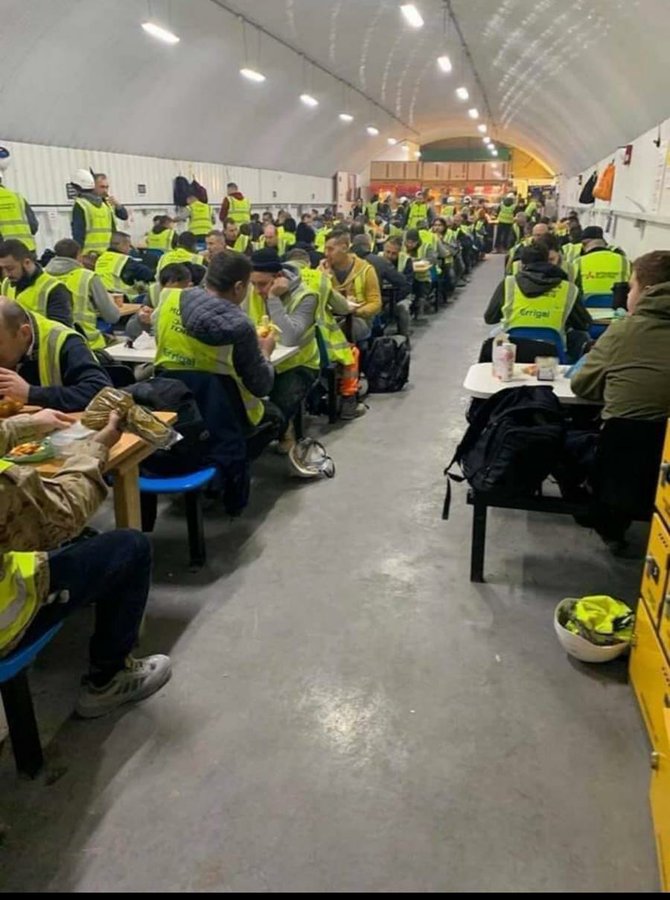
Unite the trade union has asked members on construction sites to submit photographic evidence of unsafe working conditions. In this way, the union is maintaining a level-headed response and taking its social responsibility seriously. Plenty of evidence has been presented across the country, including Scotland.
There is great concern from the public and workers about non-essential work demanded by employers, particularly of construction workers in London where coronavirus is rampant. Workers are slamming employer complacency during this pandemic. The public transport workers on buses and tube, construction workers and others are all raising their voices in concern over the risk of contagion.
The union is concerned that members are being placed in situations where they cannot comply with social distancing guidelines and are asking for evidence to present to employers. Unite has called for the government to make sure sites are safe.
Unite assistant general secretary Gail Cartmail told union-news.co.uk: "It's not for us to call for the sites to close. It's for us to say workers' safety is of paramount importance, to inform workers what rights they have and to remove the obstacles between workers feeling they have the Hobson's choice of risking their health or poverty and hunger."
Also, more than half of construction workers are classified as self-employed, so Unite has been involved in discussions with the Treasury over payments to them. There must be guarantees over their rights to a livelihood.
In Scotland, Nicola Sturgeon called for all construction sites in Scotland to close after photographic evidence emerged of workers crowded in a small room. London Mayor Sadiq Khan has also made this call, but was overruled by the Prime Minister.
NASUWT, The Teachers' Union, March 30, 2020

The NASUWT has today written to the Secretary of State for Education, Gavin Williamson, raising deep concerns about the unacceptable actions some employers are taking at a time of national crisis.
The Union has been dealing with hundreds of calls from distressed and anxious teachers where employers are continuing with procedures that will lead to job loss or detrimentally affect teachers' pension provision.
Contracts are being prematurely terminated with immediate loss of salary. Government guidance on unnecessary journeys is being ignored. Teachers are being penalised for self-isolating and in some cases teachers with vulnerable health conditions as defined by Government are being told their condition is only 'mild' and they should be at work.
Ms Chris Keates, NASUWT Acting General Secretary said:
"In these unprecedented times, we have seen the best of employers, showing genuine concern and care for teachers, headteachers and other staff, who are in the front-line providing ongoing support for the children of other key workers and vulnerable children.
"Regrettably, however, we are also experiencing the worst of employers who are choosing to ignore the reality of the current situation and callously, unfairly and unjustifiably continuing with practices which are adversely affecting teachers' lives and livelihoods.
"Teachers rights and entitlements are being trampled over, as these opportunistic employers drive through procedures and processes and make decisions which will lead to job loss and in some cases immediate loss of income as contracts are prematurely terminated.
"We have lost count of the number of cases where we have been contacted by highly distressed teachers with underlying health conditions who, according to Government guidelines, should not be in work but are being subjected to their medical diagnosis being second guessed by employers.
"The cases we have been dealing with in the last few days sadly demonstrate that too many employers have lost their humanity when dealing with their staff and not even a national crisis has been able to cause them to change their ways."
Coronavirus Safety Failings
NASUWT, The Teachers' Union, April 3, 2020
Over half of teachers who should have been self-isolating due to Coronavirus have been asked to attend work, a survey by the NASUWT-The Teachers' Union has found.
A snapshot survey of teachers has found that 51% of teachers who thought either they or someone in their household had Coronavirus were still asked to attend work for at least some time during the week beginning 23 March, the first week that schools were closed to all but the children of key workers and vulnerable children.
A further 39% who are classed as being in a vulnerable group due to underlying health conditions, pregnancy or age said they were also asked to attend for some or all of that same week.
While seven in ten teachers said they felt their school was treating them fairly over the pandemic, the survey found a significant number of teachers did not have the facilities or information to keep themselves and other safe while working in schools.
Nearly a third (32%) said there was not adequate provision of soap and hot water for hand-washing in their school, nearly one in four (39%) said they had not been provided with appropriate guidance on maintaining school distancing by their employer and nearly half (48%) reported a lack of adequate arrangements to frequently clean and disinfect frequently touched surfaces and objects in their school.
The survey also found:
· Although the vast majority said their school is operating rota arrangements, only 39% said the rota in their school had been consulted on and agreed with staff;
· Almost all (98%) of teachers said they had been asked to attend school during the Easter holidays;
· Over a third (36%) of teachers reported they had not been provided with the necessary IT equipment by their school to enable them to work from home;
· Less than a quarter (24%) of teachers said they had been consulted on and agreed their work programme with their employer for working from home
Ms Chris Keates, NASUWT Acting General Secretary said:
"At this time of national emergency, teachers are in the front-line of keeping schools open for the children of key workers and vulnerable children whilst also to provide ongoing learning and support for children who are learning at home.
"It is pleasing to see that the majority of teachers feel they have been treated fairly by their school in the arrangements they have made.
"However, it is deeply concerning that a smaller, but still significant proportion of schools are failing to protect the health and welfare of their staff.
"Insisting that teachers who are either in vulnerable groups or who may have Coronavirus or live with those who have symptoms attend work is simply playing fast and loose with the safety and welfare of those staff. At a time when we all need to be acting responsibly in order to halt the spread of COVID-19 such actions are reckless.
"It is also deeply concerning that a large number of teachers report that good hygiene is not being followed in their school.
"Employers have a duty of care to do all that they can to keep workers safe, yet it seems that in too many cases too little protection is being put in place.
"In these unprecedented times it is deeply concerning to see that the adverse management practices some teachers face when their school is working normally are now following them into their home. Excessive workload, intimidation and punitive scrutiny are all being faced by teachers by employers who fail to respect teachers' professional judgement and fail to recognise that teachers, like all of us, are trying to manage their professional duties while also dealing with significant strain and worry about their families, their finances and their health.
"One of the mantras to emerge from this period is that 'we are all in this together' but the callous and reckless actions of some employers demonstrate that this message is little more than an empty slogan for too many teachers."
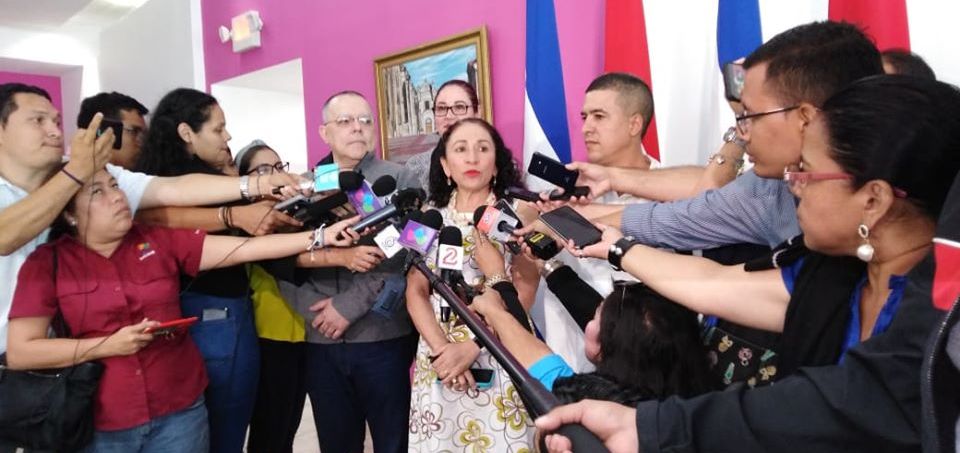
Cuban medical brigade arrives in Nicaragua
In the midst of the current pandemic, Cuba's "medical internationalism" has provided an inspiring example of what can be achieved by a small country that puts the health of the people, both at home and abroad, in first place. It has put to shame many larger and wealthier countries. Cuba's example is even more remarkable, given that it has to develop its medical programme under the conditions of an economic blockade imposed for over fifty years by the United States. Even in the current circumstances, the government of the United States has recently prevented shipment to the island of Covid-19 test kits, masks and ventilators donated by the owner of the Chinese e-commerce company Alibaba.
On March 21, a 53-strong Cuban medical brigade arrived in Lombardy, Italy, at that time the epicentre of the pandemic in that country, to assist local healthcare authorities. The health workers were members of Cuba's Henry Reeve Contingent, which in 2017 received a World Health Organisation (WHO) Public Health Prize in recognition of its worldwide role of providing free emergency medical aid. The Henry Reeve brigade was first created to assist needy people in the United States, following Hurricane Katrina, but its assistance was rejected by the United States government. Cuba currently has 29,000 medical workers deployed in 59 countries. Doctors are often sent free of charge to low-income countries in the Caribbean, Latin America and Africa.
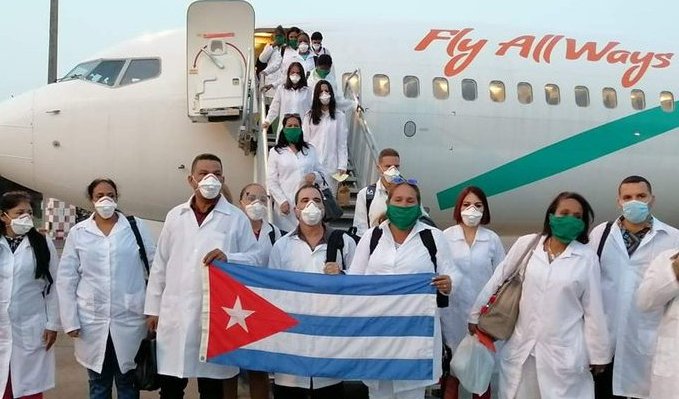
Cuban medical team arriving in Surinam
In addition to Italy, Cuba has so far sent medical specialists to 37 of the 59 countries in which its healthcare workers are already operating in order to treat Covid-19 cases. These countries include Andorra, Nicaragua, Venezuela, Surinam, Jamaica, Belize, Antigua and Barbuda, Barbados, Grenada, Haiti, Saint Lucia, Dominica, Trinidad and Tobago, St Kitts and Nevis, Saint Vincent and the Grenadines. Welcoming the health workers to Dominica, the Prime Minister of that country remarked, "I have always said that you know who your friends are in times of trouble." The Prime Minister of Belize called Cuba "the world leader in solidarity". According to press reports, the government of the British Virgin Islands (BVI), in all but name a British colony, has also requested the medical aid of 30 Cuban health professionals so as to fight the Covid-19 pandemic. It has also been announced that the French government has agreed to accept Cuban medical assistance in its territories in the Caribbean region such as Martinique, Guadeloupe and Guyane.
About 200 doctors from Cuba are helping to stop Covid-19 in South Africa, the country most affected in Africa by the epidemic. The doctors are distributed in eight of the country's nine provinces, and are working in 111 health institutions, at the regional and district levels, as well as in rural, difficult to access areas. Cuba has also trained more than 600 young South Africans who will graduate as doctors this year as part of the Nelson Mandela-Fidel Castro Co-operation Programme, the largest graduation of doctors in the history of South Africa. In Angola, Cuba has sent more than 250 specialists and health professionals to combat the current pandemic. This is in addition to the more than 800 Cuban health workers and more than 1,000 education aid workers who already serve in the country. 350 123

Cuban Doctors in Andora
Cuba has a long history of providing health care to other countries, dating back to 1960 when it sent medical assistance to Algeria. It has for example sustained over 20,000 healthcare workers in Venezuela for a decade, with thousands more in neighbouring countries, especially throughout the Caribbean. In 1999, Cuba established a new Latin American School of Medicine (ELAM) in Havana to provide free medical training to students from the region. ELAM was soon enrolling students from around the world, including the United States. By 2019, over 29,000 doctors from 115 countries had graduated. Half of them were young women, 75% the children of agricultural workers, and many of them from indigenous populations. Today ELAM is the largest medical school in the world, where 500 students from 84 countries graduated last year.
In recent years, Cuba has made particularly notable contributions to combating disasters all over the world. In 2010, it responded to the catastrophic earthquake in Haiti, which killed 230,000 people and left 15% of the population homeless. The Henry Reeve Contingent arrived within 24 hours, joining the 344 Cuban medical professionals already working in Haiti, alongside hundreds of Haitian physicians trained in Cuba. Cuba-Haiti medical co-operation had been initiated 11 years earlier following Hurricane Georges in 1998. Within a few months another 748 Cubans had arrived, along with 481 Haitian graduates from ELAM and 278 ELAM graduates from 28 other countries.
In 2014, Cuba was the first country to respond to a WHO request for health workers to combat Ebola in West Africa and sent the largest medical contingent of 256 medical professionals to Guinea, Sierra Leone and Liberia, countries where Cuban medical missions already operated. Since the early 1960s some 76,000 Cuban health professionals have worked in 39 African countries. In the same period a total of over 400,000 Cuban health workers have worked overseas in 164 countries
In 2003, the Cuban leader Fidel Castro explained his government's approach when he stated: "Our country does not drop bombs on other peoples, nor does it send thousands of planes to bomb cities; our country does not possess nuclear weapons, chemical weapons, or biological weapons. Our country's tens of thousands of scientists and doctors have been educated in the idea of saving lives."

In his March 27 address to the special Virtual Summit of the G20, called by Saudi Arabia, UN Secretary General António Guterres once again called for a ceasefire of all conflicts between nations so that humanity as one can focus on overcoming the COVID-19 pandemic. He once again called for the lifting of sanctions against countries so that they can employ all the resources needed to fight the virus.
Two days earlier, Russia, Syria, Iran, Cuba, China, the Democratic People's Republic of Korea (DPRK), Nicaragua and Venezuela sent a joint letter to the UN Secretary General calling on him to demand that sanctions be lifted on countries that are being hindered in their national efforts against the virus. Additionally, Russia has submitted a resolution to the UN General Assembly calling for the lifting of sanctions against targeted countries, in order to by-pass the US veto at the UN Security Council.
Guterres pointed out in his speech that "we are in a war and are not winning it. It took the world three months to reach 100,000 confirmed cases of the infection. The next 100,000 happened in just12 days. The third took four days. The fourth,just one-and-a-half. This is exponential growth and only the tip of the iceberg. This war needs a wartime plan to fight it. Solidarity is essential... That is why I appealed for a global ceasefire."
The appeal by Guterres has been taken up by many countries who, even before his call, had been in action to assist others. Cuba, for example, while facing brutal US sanctions itself, is expressing once again its legendary internationalism by sending doctors and healthcare workers to help in Italy, Venezuela, Nicaragua, Suriname, Jamaica and Grenada, among other countries. It even offered to help the US but the Trump administration has spurned its generous offer. Not only is the US refusing the help of Cuba to save the lives of US citizens, it has not lifted sanctions against Cuba, and it is tightening sanctions and making war threats against Iran and has put out a bounty for the capture of President Nicolás Maduro of Venezuela on the spurious charge that he is involved in trafficking in narcotics - all of which are unconscionable criminal acts at a time when the peoples of the world are standing together as one against the pandemic. Additionally, the US has been interfering in the ability of Iran to purchase medical supplies in its fight against the pandemic.
In an article in The Guardian of April 2, the UN Secretary General wrote:
Only by coming together will the world be able to face down the Covid-19 pandemic and its shattering consequences. At an emergency virtual meeting last Thursday, G20 leaders took steps in the right direction. But we are still far away from having a co-ordinated, articulated global response that meets the unprecedented magnitude of what we are facing.
Far from flattening the curve of infection, we are still well behind it. The disease initially took 67 days to infect 100,000 people; soon, 100,000 people and more will be infected daily. Without concerted and courageous action, the number of new cases will almost certainly escalate into the millions, pushing health systems to breaking point, economies into a nosedive and people into despair, with the poorest hit hardest.
We must prepare for the worst and do everything to avoid it. Here is a three-point call to action - based on science, solidarity and smart policies - for doing just that.
First, suppress transmission of the coronavirus.
This requires aggressive and early testing and contact tracing, complemented by quarantines, treatment and measures to keep first responders safe, combined with measures to restrict movement and contact. Such steps, despite the disruptions they cause, must be sustained until therapies and a vaccine emerge.
Crucially, this robust and cooperative effort should be guided by the World Health Organization, a member of the United Nations family; countries acting on their own - as they must for their people - will not get the job done for all.
Second, tackle the devastating social and economic dimensions of the crisis.
The virus is spreading like wildfire, and is likely to move swiftly into the global south, where health systems face constraints, people are more vulnerable, and millions live in densely populated slums or crowded settlements for refugees and internally displaced persons. Fuelled by such conditions, the virus could devastate the developing world and then re-emerge where it was previously suppressed. In our interconnected world, we are only as strong as the weakest health systems.
Clearly, we must fight the virus for all of humanity, with a focus on people, especially the most affected: women, older people, youth, low-wage workers, small and medium enterprises, the informal sector and vulnerable groups.
The United Nations has just issued reports documenting how the viral contagion has become an economic contagion, and setting out the financing needed to address the shocks. The International Monetary Fund has declared that we have entered a recession as bad as or worse than in 2009.
We need a comprehensive multilateral response amounting to a double-digit percentage of global gross domestic product.
Developed countries can do it by themselves, and some are indeed doing it. But we must massively increase the resources available to the developing world by expanding the capacity of the IMF, namely through the issuance of special drawing rights, and of the other international financial institutions so that they can rapidly inject resources into the countries that need them. I know this is difficult as nations find themselves increasing domestic spending by record amounts. But that spending will be in vain if we don't control the virus.
Coordinated swaps among central banks can also bring liquidity to emerging economies. Debt alleviation must also be a priority - including immediate waivers on interest payments for 2020.
Third, recover better.
We simply cannot return to where we were before Covid-19 struck, with societies unnecessarily vulnerable to crisis. The pandemic has reminded us, in the starkest way possible, of the price we pay for weaknesses in health systems, social protections and public services. It has underscored and exacerbated inequalities, above all gender inequity, laying bare the way in which the formal economy has been sustained on the back of invisible and unpaid care labour. It has highlighted ongoing human rights challenges, including stigma and violence against women.
Now is the time to redouble our efforts to build more inclusive and sustainable economies and societies that are more resilient in the face of pandemics, climate change and other global challenges. The recovery must lead to a different economy. Our roadmap remains the 2030 agenda and sustainable development goals.
The United Nations system is fully mobilised: supporting country responses, placing our supply chains at the world's disposal, and advocating for a global ceasefire.
Ending the pandemic everywhere is both a moral imperative and a matter of enlightened self-interest. At this unusual moment, we cannot resort to the usual tools. Extraordinary times demand extraordinary measures. We face a colossal test which demands decisive, co-ordinated and innovative action from all, for all.
Receive Workers'
Weekly E-mail Edition: It
is free to subscribe to the e-mail edition
We encourage all those who support the work of RCPB(ML) to also support it
financially:
Donate to
RCPB(ML)
Workers' Weekly is the weekly on
line newspaper of the
Revolutionary Communist Party of Britain (Marxist-Leninist)
Website:
http://www.rcpbml.org.uk
E-mail:
office@rcpbml.org.uk
170, Wandsworth Road, London, SW8 2LA.
Phone: 020 7627 0599: